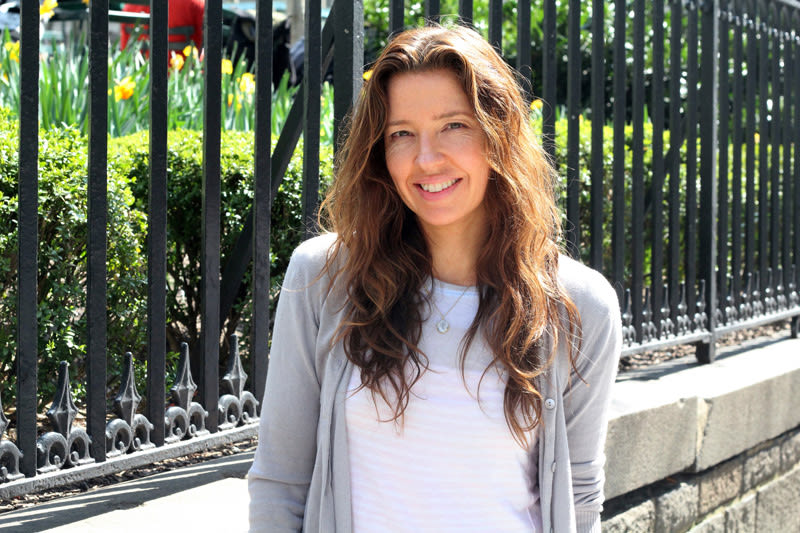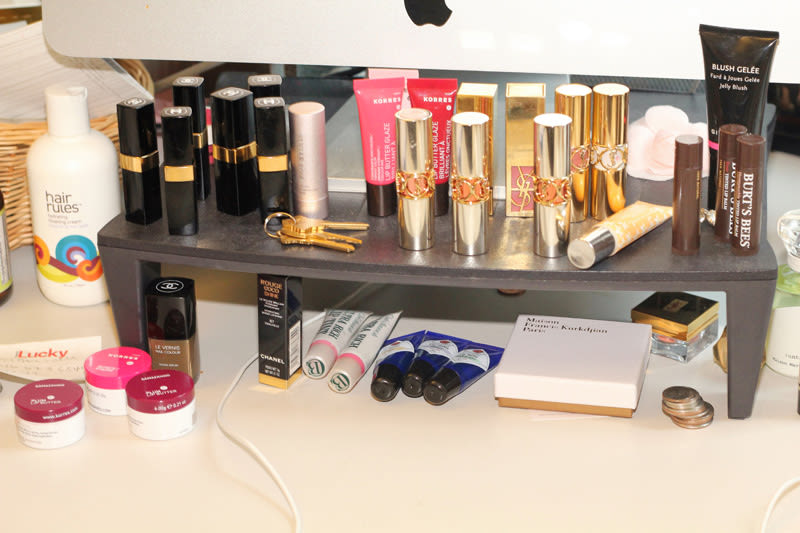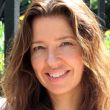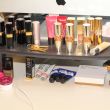“My life with beauty… let’s see. I mean, the thing I would say is that I just always wanted to be a writer. I wasn’t particularly interested in beauty. What I discovered as I became a writer is that everyone relates to beauty. You know, even the person who’s like, ‘I never wear makeup, I am totally natural,’ they have lots of Neutrogena, lots of Clinique, you know. And it’s something where people will talk about themselves at a much more personal level. When I was at Elle, I would interview celebs and if you just ask them a question like, ‘So, who have you slept with?’ they’re not going to answer you. But if you’re like, ‘When is the first time you tried eyeliner?’ they’ll be like ‘ Well…’ and they’ll tell you something pretty intimate about themselves. It's a way that people connect. Like if you’re in the gym and some girl is putting on mascara, some other girl is like, ‘What is that mascara? Oh my God, it’s so good!’ People are very generous with each other about beauty. It’s a way people recognize humanity in each other, in a weird way. I mean, people can look at beauty and they’ll be like ‘Ah, beauty is the reason everyone is tortured and miserable in our society,’ but at the same time it’s a way people connect in every culture. It’s an easy thing to write about for that reason. You know? It’s always relevant. Everybody always cares! They want to look prettier—everybody does!
I wrote for my school newspaper. I’m from Northern California. My whole family are biologists and I was so not going anywhere near any kind of science. But it’s funny because when I sit through presentations on the lengthy scientific benefits of a certain skin cream, I can feel my dad—my dad teaches at Stanford—and I think, ‘If my dad was listening to this, his head would explode.’ I always liked to write and I always loved magazines. I went to the University of Colorado at Boulder because when you open up any magazine, on the cards—you know, the subscription cards that fall out?—the return address is Boulder, Colorado. So I genuinely thought I was going to have an internship at like, Mademoiselle or Vogue when I got to Boulder where they ‘made all those magazines.’ It took me a couple of years to figure it out. I was like, ‘I know it’s around here somewhere… it’ll be here soon.’ So that was kind of silly. I did college and then I got married right out of college, and we moved to Cincinnati for my husband’s job. I thought originally that I wanted to be in advertising, and I worked in advertising for a year, and then he got promoted and we came to New York. I had been working at this tiny ad agency, and so I was doing everything. I was doing commercials for the Ohio lottery, I wrote the copy and everything because there was nobody there. Then I came to New York, and they’re like, ‘Yeah, you’re going to have to start as an assistant,’ and I was like, ‘Do I love advertising that much? I do not.’ So I got a job at this magazine called Unique Homes and you had to write the ads and the articles. It was about luxury real estate and I learned a lot there. What was interesting was that in real estate, if there are no neighbors—you know, if it’s a home on an island or out in the middle of Montana, not next to anything—every month they’d list it at a different price. It’d be like, 45 million, 17 million, 65 million! The price that it sold at was not always the cheapest. That’s something about selling anything, beauty especially: there’s a price that people want to pay for something. It’s not always about a bargain at all. I think there are many women who I meet who will be like, ‘You’re a beauty editor? Have you ever tried Crème de la Mer?’ And the reason that they’re curious about it is not that they’ve read some huge article saying all the benefits of it, it’s that it costs so much that they’re like, ‘What’s in there?!’ And you know, I say, ‘I love Crème de la Mer!’ because I’ve tried it and it’s good. But the thing that would make somebody curious about it is its price. Like, that’s their point of entry. I’m sure there’s some people who are like, ‘Oh, I heard this is great for burns,’ or, ‘This is amazing for anti-aging,’ but most people are like, ‘ Whoa. What’s in that stuff? It’s so expensive!’
So that was kind of an interesting thing to learn there, but I learned a lot about writing and I eventually wrote for a trade magazine for architects and interior designers. And my grandmother—I was really close to my grandmother—she was always like, ‘When are you going to write for a real magazine, one that I can pick up at the newsstand?’ So I started writing articles. All the journalism school advice tells you to write a proposal and send it to the magazine, and instead I was like, ‘I’ll just write the article.’ Like, how much more effort does it take to finish the article and write it in the voice of the magazine? Because the letter—the pitch—is kind of not in the voice of the magazine. So I wrote a piece for New York Magazine about an artist and that got in. And then I wrote a piece for Condé Nast Traveler. I always give people that advice. I don’t know anybody that followed it, but it’s definitely my number one get-ahead-in-magazines advice: write the article, don’t write a proposal. Then I had a friend who worked at Vogue and she called me and was like, ‘A beauty story just fell out at the last minute. Will you come up with something over the weekend? You know, maybe they’d look at it. Who knows?’ I was like, ‘Alright,’ and the story I wrote was about this makeup artist that was just starting her new line and it was Bobbi Brown. That was my first beauty article. I started writing for Vogue a lot, and then other magazines just called me up and I wrote—I don’t know for who, maybe it was for Glamour—I wrote an article about alpha hydroxy acids, and I just became, like, ‘the alpha hydroxy acid girl.’ I felt like Cinderella, in a bad way. All of a sudden every magazine said, ‘I need an article about these things.’ I didn’t want to keep writing about them, but I spent every weekend, all night long writing about alpha hydroxy acids. But I got my name out there, whish! Everywhere. I started writing a lot for Elle. A senior editor position came up and they knew they liked my writing, so they hired me. That was sort of how I ended up in beauty, but it just was an easy place for me. For the reasons I said—people relate to it. But also, at the time there were not a lot of decent writers writing about beauty. The beauty section was very just sort of like, ‘Here’s a list of names of products,’ and usually, it wouldn’t have the voice of the rest of the magazine. You’d get to the beauty section and become like, ‘Oh, and here’s the list of products.’ I feel like that was in like, 1994. That was when I got the Elle job, and then a year later I got the beauty director job.
I was at Elle for about six years, until the internet—until the year 2000 when every beauty editor left to go to some gnarly website. I did it also, and it taught me that I am not a retailer. I’m not interested. I went to a now-defunct—very quickly defunct—site called beautyscene.com. It was a very harsh experience in the realities of working for some small company where you don’t know the principles, and I was used to trusting that people would pay their bills—that kind of thing. It was a very different, very rough experience. So when Kim France called me and was like, ‘Oh, you’d never leave. Would you? You’d never come back to magazines,’ I was like, ‘ Oh my God! Of course I would!’ I knew her from Elle—she had been a features editor. That was when Lucky was starting and she was the editor-in-chief. So I’ve been here since the beginning. And with beauty in a magazine, I’ve always felt that just saying, ‘This is new,’ is very boring. You know, with fashion it’s totally enough—‘This is new? Everybody is wearing it? Good!’ But with beauty, I feel like if there’s a product you’ve used for ten years, that’s a pretty ringing endorsement. Like, I want to try it. [Laughs] The oldest product is kind of compelling, as well as the new one. You want to see the new colors and the incredible packaging, or whatever it is. But you also want to know what mascara that girl is wearing, who always looks fabulous, you know? Or, there’s some perfume that someone has worn for twenty years—I want to know what that perfume is. So I wanted the feeling, the voice, to be the voice of your friend—all of Lucky is the voice of your friend. You’d see these real girls, real girls that you want to be—some cool shop girl or some something, you know? Some fabulous blogger [Laughs] Somebody who you’re like, ‘Wow, that’s a cool job.’ And, ‘Isn’t she interesting?’ but she’s not just a model, she’s not just like, ‘Oh yeah, I just drink water, and use a lot of moisturizer.’ Where they’re a real person, and they just discovered these things and they rely on them, and their friend told them. Like, that feeling of community, kind of. I always want that in the section as well as the stuff from the runway. I’m seeing stuff from the store, I’m seeing stuff from my friend’s medicine chest, you know? I feel like it has to be a mix. So that was something, because I feel like a lot of beauty sections are very just like—this is new, this is new. And I would say even to people who write for me, that can’t be all if it. It has to be like, ‘This is new, and it happens to be incredibly flattering.’ You know? It can’t just be, ‘It exists’. Beauty’s even more personal because it sticks around. Some things that you have stick around in your closet, but not as much as beauty. I have things I still can’t get rid of.
Brandon (Holley, Lucky’s editor in chief) and I have been working on taking the idea of community in the magazine even further, with a monthly Q&A section where I’ll be answering reader questions. At the office, my assistant puts out everything that comes in, and she separates any promotional items—press releases, anything that comes with it. I have the products by themselves, because you shouldn’t need a whole explanation to understand what this particular soap is about. I never take notes at events either, because I feel like, if I don’t remember it, how interesting could it be? If I need to take notes on it, it’s probably not going to blow my reader over. So then it’s sort of like shopping, on my desk. If you were walking along in a store, something would catch your eye because it was pretty, or because it had a whole bunch of color, a million choices, you know? The same things that a person who’s shopping is drawn to, is what makes me look at something. You can tell someone visually, like, ‘Oh, this thing is just so pretty!’ or, ‘Wow, this is deodorant it looks so pretty—it looks like perfume.’ Or it could be the promise of something—it could be, you know, this ‘eye illuminator.’ If you created the secret of youth in a jar, you could claim it—but you have to tell someone that somehow. So it’s very much like I said, it’s like shopping. Once a week, I clear everything out and I edit what I think could make it in the magazine that I think is cool. We put that on a table in the beauty closet, and then once a month we all go through that. And there’s stuff from my editors that they’ve loved too. And then we’ll sort of narrow it down to what we really think should go in Lucky. I will start picking out a few things beforehand—as you can tell, I have a lip problem. I just always want lip stuff. I have to have it nearby, I love it so much. So things that I like are by my computer.
I wrote my book, 'Gift With Purchase: My Improbable Career in Magazines and Makeup,' because I just kind of wanted to get all my memoir-y stuff out of the way. And I had a lot that didn’t go anywhere else that people always asked me about. You know, people would say all the time, ‘Oh, can you write a beauty book? We’ll have a writer for you,’ and I’m like, ‘What I like to do is the writing part.’ I was happy I did it, and it was fun and I had this incredible moment that resulted from it, which was when the paperback was out, Procter and Gamble called me up and they were like, ‘We’re having this huge convention of all of our PR people from all over the world. Would you be a speaker and read from your book?’ Because I talk about events and what it’s like to be a beauty editor, you know, the whole thing. So I was like, ‘Of course I’ll come! That’s fantastic,’ and they gave everyone my book. Procter and Gamble is in Cincinnati, and you may remember I started out in Cincinnati. So they fly me into Cincinnati and I’m literally descending down on the plane and I’m like, ‘Oh my God. This is where I started my career.’ If you had told me that I would be flying into Cincinnati to visit Procter and Gamble— the most important thing in that town, that the gnarly ad agency I’d started at couldn’t even get as a client—my just-out-of-college self would have thought, ‘ OH MY GOD, I’VE WON THE LOTTERY!’ And that I would be flying in, from my magazine job where I was an editor at a magazine writing a column, and that I had written a book, and that’s why I was coming…it made me realize that I have done what I wanted to do. I’m doing what I want to do, and how many people can say that? I’m not necessarily happy to see piles of products, I’m happy when I see the one thing that gets me excited. You know? I’m like, ‘Ugh, I see that, that, and that. Oh! What’s that? That’s fun!’ And I like that I get to write. I really like to write, I like to edit, I like the visual side of it…I just love magazines.”
—as told to ITG




